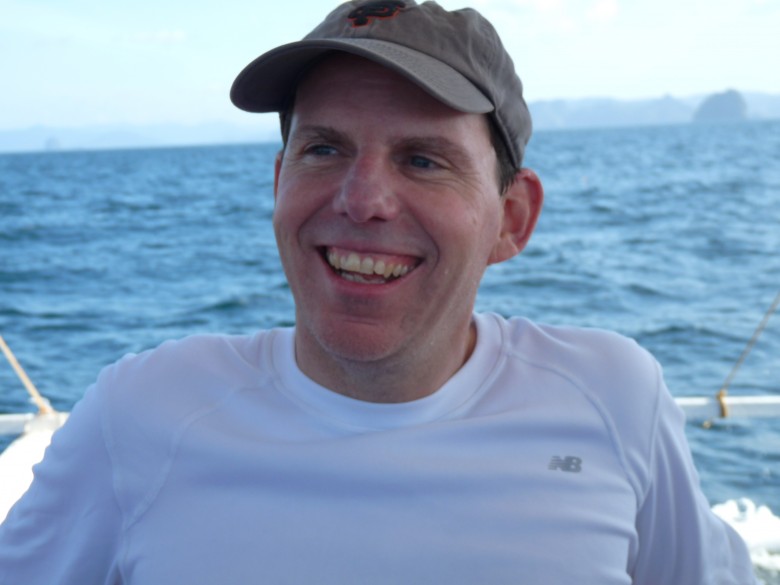
Dr Jim Sanchirico, University of California (Davis), at El Nido, Philippines. (Photo: M. Paterson).
Meet the team: Jim Sanchirico, environmental economist
January 22 2016
For Dr Jim Sanchirico, one of the most satisfying pursuits in his life, personally and professionally, is helping others to achieve their potential.
Whether coaching Davis High School students to ski faster, PhD students to award-winning dissertations, or whole communities to sustainable practices, Jim is happiest when working with others to reach a shared goal.
So when Jim, an environmental economist at the University of California (Davis), was invited to join the Capturing Coral Reef & Related Ecosystem Services (CCRES) team he was eager to get involved.
“I’ve made a conscious effort to shift my research agenda to a broad focus on sustainable fishery management and the provision of ecosystem services in developing countries,” Jim says.
He recognizes that CCRES represents a significant effort by the World Bank and project partners to boost the conservation capabilities of developing nations in the East Asia-Pacific region.
“I’m very supportive of the CCRES mission to improve the practice of conservation. The consideration and inclusion of local livelihoods is helping to move conservation practices in the right direction,” he says.
“This project presents another chance to work with (CCRES chief scientist) Peter Mumby and other researchers from The University of Queensland. We have worked together on previous projects, and I’m excited to collaborate once again.
“Finally, I appreciate that CCRES, as a consortium of researchers, is working at a scale much larger than that at which I typically operate.”
The size and scope of the CCRES project means that Jim is now part of an interdisciplinary endeavour that includes research, systems thinking, business development, communication and training.
“I see my role as bridging the gap between components, with my research exploring the connection between the ecology of environment, household livelihoods and local businesses,” Jim says.
“My research group is building models of the local economy that include fishing and non-fishing households, local businesses (restaurants, stores, etc.) and the tourism sector in El Nido. These models use survey data collected by the team, to predict the labour allocation decisions made by households. We can predict the likely amount of labour available to the fishing, farming, retail, construction and other industries. ”
By closely examining the ecological and economic conditions under which locals make the decision to go fishing, Jim and his team can map out how marine conservation efforts will impact the livelihoods of local residents. These maps can be then be used by local planners to understand the likely consequences of any conservation actions they take.
Jim, who recently coached a student to an Association of Environmental and Resource Economists (AERE) Outstanding Dissertation Award, says he looks forward to coaching coastal planners in the Philippines and Indonesia to create award-winning conservation programs.
For more details, contact;
Prof. James N. Sanchirico
Department of Environmental Science and Policy
University of California, Davis
Tel: +1 530-754-9883
jsanchirico@ucdavis.edu



